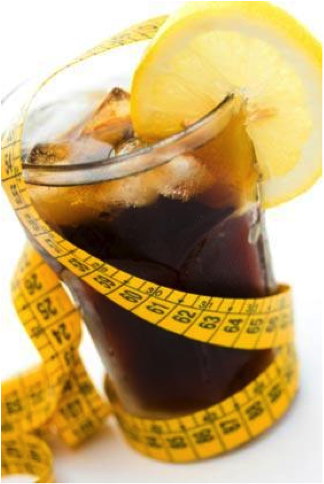There is a vast amount of research and opinions circulating the nutrition industry around artificial sweeteners and their affects on our diets. Consumers are constantly advised conflicting information. One idea is that artificial sweeteners in foods such as diet beverages increase one’s dietary intake and desire for sugary foods. A recent study done by Piernas and researchers at the University of North Carolina on the intake of artificially sweetened beverages and the affects on human diets found that diet beverages had no affect on preference for sweets or greater food consumption1.
This study was part of a randomized control human trial that observed dietary patterns of those involved in the Choose Healthy Options Consciously Everyday (CHOICE) study. Participants, 318, were randomly put into a groups that replaced >2 servings (>200 kcal per serving) of liquids per day with water or diet beverages. Data, as 24 hour recalls, was collected after 3 and 6-month intervals. This was a weight loss study so there was a significant decrease in total energy intake in both groups. There were little differences between food and beverage intake between the groups. Both subject groups also decreased dairy and protein intake after 6 months. However, the diet beverage group greatly decreased the amount of desserts intake at 6 months compared to the water group, which challenges the notions that diet beverages and artificial sweeteners increase taste preferences for sweets. The study also stated, “In general, although this study was not designed to definitively address the issue of low-calorie sweetened food and beverage intakes on the habituation to sweetness and desire to consume greater sweet foods, it provides preliminary evidence to counter this argument.” This data shows that there is no correlation between increased food intake and those who consume water or diet beverages sweetened with artificial sweeteners1.
This study provides excellent evidence that replacing sugary drinks with diet beverages facilitates weight loss and has no association with increased food intake. The relationship between artificial sweeteners and weight loss intervention this study provides requires further study. One of the limitations to this study are the questions it raises, such as what are the diet affects from artificial sweeteners on those not on a weight loss intervention. Other than these limitations that arise from this study being very specific to one particular a group, the study is strong. This was a controlled human subject intervention that observed food intakes of those subjects at home while performing regular, routine schedules. The study also provides insight into how replacing high caloric beverages with water and diet beverages affects intakes of different food groups over short and long-term weight loss.
There has been evidence that consumption of soft drinks is identified as having a higher incidence and prevalence of developing multiple metabolic risk factors such as obesity, impaired fasting blood glucose levels, and increased waist circumference2. Because of these risk factors many studies have been done on diet beverages and its association to weight. The relationship between artificially sweetened drinks and weight loss intervention has been tested in many scientific studies. In a human study done by Anton in 2010 it was found that those who drank diet sodas did not consume a greater amount of food and did not have an increase in appetite compared to those that consumed sugar-sweetened sodas3. This relationship of sugar drinks to weight was shown to increase overall body weight, fat mass, and blood pressure after a 10-week intervention trial that compared these results to those who substituted soda for diet beverages4.
From these studies and the human trial study by Piernas we have observed how artificial sweeteners do not alter caloric and food intakes any more than water does. Human control trials have repeatedly shown results for those who drink artificially sweetened beverages in place of sugary drinks have lower risk for metabolic syndrome and chronic disease risk1-4. Therefore, it is advised that those who consume high amounts of sugar drinks may benefit from replacing them with diet beverages to reduce overall metabolic syndrome and chronic disease risk.
References
1. Piernas C, Tate DF, Wang X, Popkin BM. Does diet-beverage intake affect dietary consumption patterns? Results from the Choose Healthy Options Consciously Everyday (CHOICE) randomized clinical trial. American Journal of Clinical Nutrition. 2013; 97 (3): 604-611. doi: 10.3945/ajcn.112.048405.
2. Dhingra R, Sullivan L, Jacques PF, Wang TJ, Fox CS, Meigs JB, D’Agostino RB, Gaziano JM, Vasan RS. Soft drink consumption and risk of developing cardiometabolic risk factors and the metabolic syndrome in middle-aged adults in the community. Circulation 2007;116:480–8.
3. Anton SD, Martin CK, Han H, Coulon S, Cefalu WT, Geiselman P, Williamson DA. Effects of stevia, aspartame, and sucrose on food intake, satiety, and postprandial glucose and insulin levels. Appetite 2010;55:37–43.
4. Raben A, Vasilaras TH, Moller AC, Astrup A. Sucrose compared with artificial sweeteners: different effects on ad libitum food intake and body weight after 10 wk of supplementation in overweight subjects. Am J Clin Nutr 2002;76:721–9.
Reviewed by Viktoriya Wolff







